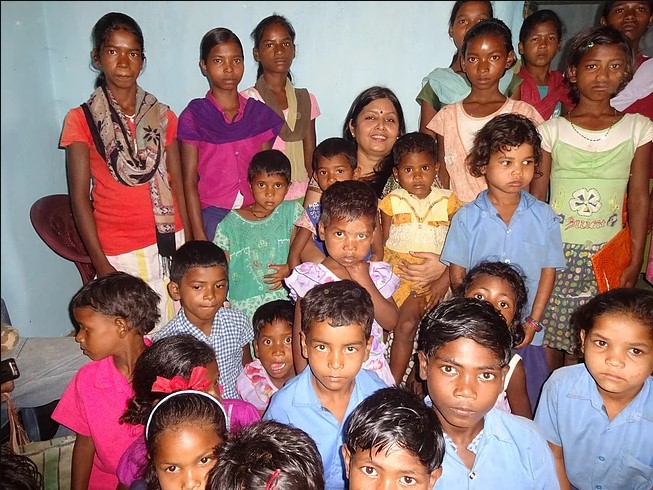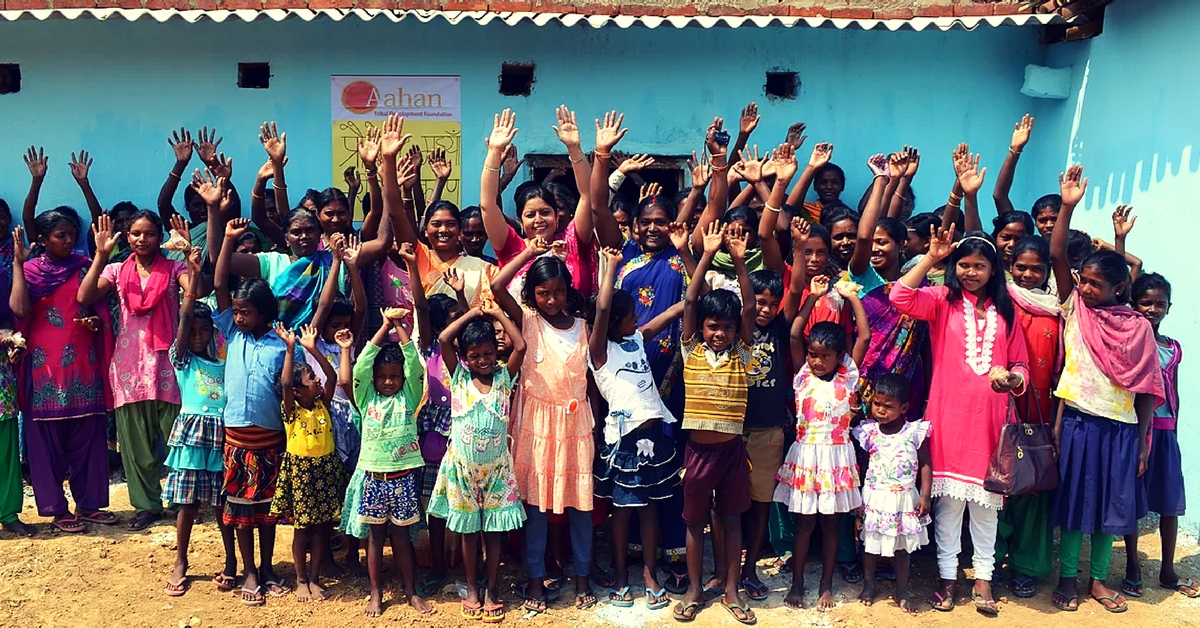Five years ago, Rashmi Tiwari recalls entering a small tribal home in Orissa, as part of a social welfare funding project for CEO Clubs, India. The ground reality of the red corridor in the country shook her to the core.
She stared in absolute horror, as parents of minor girls as young as 5-6 years old, offered them to her in exchange of money.

While one home had three grown up girls sharing one set of clean clothes, most daily wage laborers struggled to have two meals a day. This marked the watershed moment of her life.
“Minor girls were being pushed into the web of trafficking and nobody was bothered. I was witnessing the worst kind of human rights violation on the ground of my own country.”
Returning to Delhi, she decided to quit her corporate job and luxurious life to visit tribal areas of India in an attempt to understand the extent of trafficking and empower tribal girls and women.
Who is Dr Rashmi Tiwari?
Rashmi was only nine when she was pushed out of the comfort of her Mumbai home with her single mother. There was no roof over her head and certainly no source of income for her uneducated mother. Enrolled at Saraswati Uchchatar Kanya Vidyalaya in Varanasi at 10 years old, there was never enough money to buy school uniform or books or lunch.
It was a common to see a young Rashmi break into Amitabh Bachchan’s Aaj Rapat Jaayein or mimic him to entertain the senior girls, who lent their old belongings to her. She’d work at the soap factory as a child labourer after school. Living out of a 3.5 x 5.5 m box room in Varanasi, she completed her Masters and earned her PhD degree in Economics from Banaras Hindu University in 1998-99. She then established herself in the corporate world.
Human trafficking v/s Sex trafficking
How many times have you witnessed a neighbor or a friend calling out to a choti in their homes to get you a glass of water or feed the toddler, and you did not bat an eyelid?
While ‘sex trafficking’ draws a sharp response from most people, human trafficking as modern day slavery – by hiring underage girls as child laborers or domestic helps – easily disguises itself as a socially accepted norm, says Rashmi.
“The demand and supply for these underage girls are not only in tribal areas but also the leading metros. In fact, city dwellers create the demand. Unknowingly and unintentionally, we are all contributing to it. Every time you hire a tribal underage girl from an agency as a house-help, even if you don’t abuse her. Or buy products and services that involve child labor and bonded labor, you are partaking in this grave human rights violation.”
She lays down hard-hitting facts that state India is one of the top five countries in the Global Slavery Index. Large tribal populations, on the brink of extinction in the red corridors of India, become breeding grounds for trafficking.
Similar problems exist in the state of Jharkhand, notorious for Naxal activities, where Rashmi’s Aahan Tribal Development Foundation works for the upliftment of tribal women and girls.
Stating the sociocultural context in these areas Rashmi expresses how generations of debt and bonded labor in tribal families make vulnerable girl children easy victims. Very often, these innocent girls are offered to the traffickers by the parents themselves. Or sometimes traffickers lure the parents and the girls with the dreams of a better life and job opportunities.
Over 40% of these girls disappear without any trace. Even if they escape, going back to the villages without making money for the agent is never an option. Threats, physical abuse, starvation and multiple sexual assaults by several men several times a day are common practices to make them comply, surrender and suppress their voice.
These girls don’t live to dream, they dream to live.
Read more: From War in Sudan to Cholera in Yemen, Dr Kaki Has Faced It All to Save Her Patients
Aahan Tribal Development Foundation
Speaking about the vision and mission of Aahan Foundation, Rashmi says, “I wanted a sunrise for these girls as a result of their own collective efforts, not a result of anybody’s charity.
‘Aahan‘ refers to a new dawn.
Shedding light on the many challenges that she had to face while starting her work Rashmi shares, “I had never been to Jharkhand before. I had no funds, no resources and zero experience of working at the grassroots level in the social sector.”
On her first visit to a tribal village in Jharkhand, she thought of the most unconventional way of getting women and young girls to open up to her. She lured them by samosas and gulab jamuns and showed them anti-trafficking films on her laptop. Initially reluctant, the turnout started improving.
Most fathers, uncles, brothers and even traffickers started attending these chats who mistook Rashmi for an organised trafficker, who would lure the mothers along with the girls this time without paying them a penny.
Little did they know, she was here to disturb their entire system and train these girls to fight for their own rights. Slowly, she started gaining the trust by interacting with the women Sarpanch and members of the self-help groups, who enjoyed great respect among tribals. It helped her in breaking the ice and take tribals into her confidence.
But it was a huge challenge to convince women and young girls to live their lives on their own terms.
“The constant fear of getting trafficked locked them in a cage that dictated that they had to earn enough money to feed their families.What was needed was a behavioral shift,” says Rashmi.
But now Rashmi had already come under the radar of the traffickers, local leaders and politicians who threatened to hurt her if she did not back down. She recalls an incident when she was on the brink of being kidnapped by Naxalites and was allowed to escape because locals intervened. That did not stop them from hitting her and threatening her to return to the city.
It’s been over 3 years, her projects are still working successfully in over 50 villages reaching out to over 5000 women and girls.
Impact
Aahan Foundation started in 2013, provides vocational training to girls and women in sales, marketing, sports, performing arts and arts. To prevent trafficking and promote holistic growth, they run Aahan Fellowship for Tribal Girls and Women, a year long leadership program, Udaan a week long program to get selected tribal girls and women to New Delhi to meet with leaders political, social and business areas, Village Level Mentoring Programs and Global Tribal Mentoring Walks.
Today members of the Aahan family are successfully working as corporates, nurses, teachers, panchayat leaders, mason and builders, professional football players, and constructing toilets as social workers.
As a Rupanti Munda dons an Indian Jersey at the Homeless Cup, a 14-year-old Rupni Barla speaks at TEDx about bouncing back strongly and representing India in Marathon runs across the globe. Aarti Munda saves the dying Madhubani and Surahi art on women’s issues and now wants to start an art and culture school in her village.
Biresh Devi who struggled as a child bride, now works as a pink auto driver in Jharkhand.
Rashmi talks about her biggest experiential learning saying, “You don’t need a lot of money or too many people to drive change. We had no resources, no experience, and no business model. It’s been over three years and we have sustained our activities without any major funding. We focus on impact sheets than excel sheets. One needs to measure how much change is one bringing in the lives and mindsets of tribal girls and women. I am not discounting the need of money, but revolutionary ideas do not ride waves of change based on the rationale of money.”
Get in touch with the Aahan Foundation here. Write to Dr Rashmi at rashmi@aahanfoundation.org
Like this story? Or have something to share?
Write to us: contact@thebetterindia.com
Connect with us on Facebook and Twitter.
NEW: Click here to get positive news on WhatsApp!
If you found our stories insightful, informative, or even just enjoyable, we invite you to consider making a voluntary payment to support the work we do at The Better India. Your contribution helps us continue producing quality content that educates, inspires, and drives positive change.
Choose one of the payment options below for your contribution-
By paying for the stories you value, you directly contribute to sustaining our efforts focused on making a difference in the world. Together, let's ensure that impactful stories continue to be told and shared, enriching lives and communities alike.
Thank you for your support. Here are some frequently asked questions you might find helpful to know why you are contributing?

